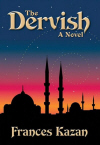The Dervish
Turkey is in turmoil. World War I has just ended and the mighty Ottoman Empire is on the brink of collapse. The empire is being carved up as Allied protectorates. In a world of foggy truths, mistrust, deceit, and the weariness of war enters a young American widow, who is fleeing from memories of a distant past and wounds still raw from the death of a loved one.
Turkey is in turmoil. World War I has just ended and the mighty Ottoman Empire is on the brink of collapse. The empire is being carved up as Allied protectorates. In a world of foggy truths, mistrust, deceit, and the weariness of war enters a young American widow, who is fleeing from memories of a distant past and wounds still raw from the death of a loved one.
This all provides the dramatic setting for The Dervish, Frances Kazan’s follow-up novel to Halide’s Gift. Mary Benedetti, the American protagonist, narrates the story more than 40 years after her husband’s death. Mary is an artist from Manhattan who recently lost her husband, Burnham, in the war. She visits Constantinople in 1919 to be with her sister, who is married to an American diplomat. Mary, enchanted by the exotic sights and sounds of the Orient, is quickly drawn back to her easel board, and throughout the story, her renderings on the canvas serve as a peephole into her mind. Through a quirk of fate, Mary witnesses the murder of a young Turk and is consequently drawn into the nationalist struggle for a free and independent Turkey. At first, she is a silent observer, but soon, she becomes an activist herself, leading surreptitious missions out of the safe confines of the American embassy in Constantinople. Quite predictably, she soon meets and falls in love with a charismatic leader of the movement, Mustafa, who happens to be the father of the murdered young man.
As a piece of historical fiction, The Dervish paints a rich and multi-hued background with well-developed characters and dramatic plots including all the requisite elements for some illicit romance. There are the patriotic and brave nationalists, the conniving Allied soldiers, the curiously detached American diplomats seemingly on a moral higher ground, and then there’s Mary herself—a woman who ends up finding romance and adventure when all she sought was quiet reflection.
The narrative flow of the book is at times choppy and uneven, with abrupt transitions. The romance between Mary and Mustafa seemed unimaginative, a delayed afterthought inserted into otherwise fast-paced storytelling. At least one lovemaking scene was cringe-worthy.
Perhaps Kazan’s greatest strength, however, is her ability to render a fast-paced adventure and romance novel set in the midst of the most turbulent times in modern history. The reader is not unburdened by the weight of history even as the story remains anchored to its particular time and place.
Modern Turkey is confident, proud, and at ease with its transcontinental identity. Kazan’s Dervish breaks through this tough exterior to reveal a snapshot of its turbulent history.





